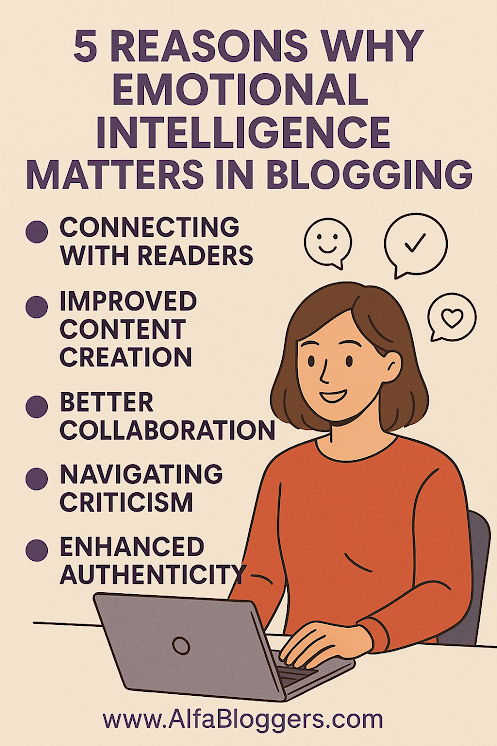
5 REASONS WHY EMOTIONAL INTELLIGENCE MATTERS IN BLOGGING
Many people think that blogging
is just about typing words onto a screen. But, actually, it’s more than just
that. It’s about connecting. Connecting with your audience, connecting with
your genre, connecting with yourself. So, whether you're writing about
parenting wins, fashion finds or heartfelt thoughts, your words hold the power
to impact, inspire and influence. And the secret ingredient that makes it all
really work is Emotional Intelligence
(EI).
What is emotional intelligence,
and why should bloggers care? Read on...
What Is Emotional
Intelligence?
In simple terms, emotional
intelligence is the ability to understand, manage and respond to emotions, both
your own and those of others. In the blogging world, it's all about being in
tune with your readers, crafting content that resonates and responding in ways
that feel authentic and human.
It’s not just knowing what to
say, but knowing how to say it so it reaches someone’s heart.
Why Emotional Intelligence Matters in Blogging
1. You’re able to Understand your
Audience’s Emotions
Let’s face it, readers don’t come
to blogs just for facts. They come for feelings. They want to relate, laugh,
cry, feel seen and be inspired.
When you write with your heart,
you can better understand what your audience may be going through; whether it’s
the confusion of new motherhood, joy of discovering a travel hack or anxiety of
life transitions. Writing with empathy makes your content more than just
informative; it makes it personal.
2. Creating Content That Connects
Emotionally intelligent bloggers
are great storytellers because they’re not just sharing what happened, they’re
sharing what it felt like. That’s the magic.
For example, Instead of saying:
"We visited a beach last weekend." You could say: "With salty
hair, sandy toes, and the sound of waves crashing behind us, it felt like time
had finally slowed down." See the difference? Emotional detail invites the
reader to feel the moment.
3. Handling Feedback with Grace
We’ve all been there. The one
comment that stings, the email that misses the point or the post that didn’t
land the way we hoped.
Emotional intelligence helps you
respond instead of react. It allows you to see criticism as feedback, not
failure. You can acknowledge different perspectives without taking them too
personally and respond with kindness, not hostility.
That’s the kind of blogger people
trust and keep coming back to.
4. Writing with Authenticity
When you’re emotionally aware,
you don’t feel the need to fake it or follow every trend just to get clicks.
Your writing reflects you. Your truth. Your voice. Just you.
Readers can sense when something
is real and when it’s not. Emotional intelligence allows you to write honestly,
vulnerably and with good intentions. And, trust me, that’s where the true connection
lies.
5. Building a Loyal Community
People remember how you make them
feel. If your blog consistently uplifts, encourages or even challenges your
audience in thoughtful ways, they will keep coming back.
Emotionally intelligent bloggers
don’t just grow traffic; they grow communities. They reply to comments, engage
meaningfully and show up with heart. That kind of energy is contagious and
deeply valued within the blogging world as well as by the readers.
Emotional intelligence is the unsung
hero behind impactful blogging. It helps you write with empathy, handle
feedback with grace and connect with your audience on a deeper level. In a
world overflowing with content, the blogs that truly stand out are the ones
that feel something and help their readers feel something too. Therefore, emotional intelligence matters in blogging.
So, the next time you sit down to
write a post, don’t just think about a topic you would like to write about or a
blog that is trending. Put down words that can resonate with someone after
reading them. Your words should help someone feel something.
That’s the real magic.
Have you used emotional
intelligence in your blogging journey? Share your thoughts in the comments. I’d
love to hear how it’s helped shape your writing!
Cindy D'Silva




.png)
.jpeg)






.jpeg)

.jpeg)









.jpeg)





.jpeg)
